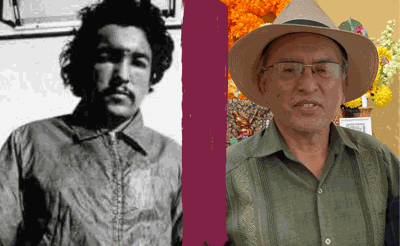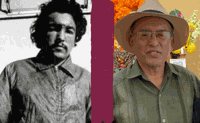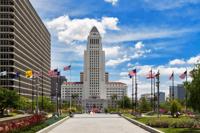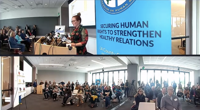On March 23, 1979, Roberto Rodriguez was a young photojournalist on assignment when he was severely beaten by law enforcement officers in his East Los Angeles neighborhood along Whittier Boulevard, this while photographing an incident of police violence. He was criminally charged with assaulting four deputies with a deadly weapon with a total of eight charges. He would go on to win his criminal trial and then, seven years later, won a lawsuit against the Los Angeles County Sheriff’s Department. Rodriguez said he suffered a fractured skull, traumatic brain injury and post-traumatic stress disorder, as well as lost his ability to recall dreams for a number of years.
“My youth was robbed,” Rodriguez said.
Today, Rodriguez, 67, has turned his trauma into a lifelong passion for social justice. The PhD emeritus scholar has taught at the University of Arizona and written multiple books and articles for national news sources.
More recently, he has helped launch the Raza Killings Database Project to find a more accurate number on how many Latinos are being killed by law enforcement nationwide. He asserted that Latinos are vastly undercounted in many public databases, such as the Washington Post’s Fatal Force Report. Rodriguez said the Post’s database places many Latino-sounding names in their “unknown” racial category or their white racial category,causing a vast undercount for Latinos.
Within the Raza database, Rodriguez’s team re-shifts some of those names under the Latino column, and they include use-of-force data from border and immigration agencies, and data regarding any fatal use-of-force, beyond shootings.
“There’s no national consensus or standard on identity,” Rodriguez said. “And so you get all these weird mappings, a big undercount.”
Nationally, the estimated number of Latinos killed by law enforcement in 2021 is 226, he said. The Washington Post posits that number at 66, with 608 in their “unknown” category.
Rodriguez said that California, and specifically Southern California, is the nation’s epicenter for police violence, with disproportionate heavy impacts also seen in cities such as Fresno, Bakersfield, San Jose and Sacramento.
“In Southern California, the vast majority of killings are of Latinos,” he said.
Additionally, his data shows that of the 226 Latinos killed nationwide, 46 were killed by immigration authorities.
Based on media coverage, “You would never know this, media wise,” Rodriguez added.
Numerous statistics have also consistently shown that Black men bear the brunt of police violence and profiling. Black Americans are killed by police more than twice the rate of white persons, per the Washington Post. And while they make up 9% of Los Angeles’ population, Black people made up 28% of LAPD stops during a six-month span in 2018, according to California Racial and Identity Act data.
“Anybody that gets targeted, they should be in alliance,” Rodriguez said. That is why Rodriguez includes data from all groups, including numbers on Black, Native American, Asian and Middle Eastern fatalities.
Rodriguez reflects on that day when he almost lost his life, a catalyst for his fight for policing reform.
“It has been 43 years since that day and it hasn’t stopped, unfortunately,” he said.
“I know a lot of survivors of torture and political violence from other countries… and people would say ‘Why would they do what they do,'” he said. “They would say, ‘We don’t want to fight but we don’t have a choice. Because if we don’t fight who will?’”
Questions and responses have been edited for clarity and brevity.
- WHAT’S THE HISTORY OF BROWN AND BLACK COMMUNITIES FIGHTING POLICE VIOLENCE?
Our communities have that history, we have fought this kind of abuse since 1492. How far do you go back? In the 60s, the Brown Berets, that was what they were fighting.
When I researched, I went to the 1950s, 1940s and 1930s. You’re talking about mass lynchings, you’re talking about mass deportations of Latinos. All that history most people don’t know. All that land belonged to Mexican peoples or Native peoples. How did they lose it? A lot of it was literally by force. It’s an ugly history for African Americans, Native peoples and Mexicanos. That’s our history.
So it’s not a recent thing. We’ve all been fighting it and the media in a way is clueless because they think it’s a competition or something new.
Our struggles are not only related, but we’re related to other struggles, too. The connections were already there, the American Indian Movement, the Black Power Movement, the Chicano Movement, and you go back, also in Mexico with the Mexican student movement, the Mexican liberation movements at the time.
In this country, there’s three groups that have always been under attack. For the longest time, it was indigenous, Black, and Brown people. Now, it’s Asian again. So for me, that is like a natural alliance.
- HOW MUCH DOES MEDIA ATTENTION MATTER IN THE FIGHT AGAINST POLICE VIOLENCE?
I’ve been looking at issues of police violence for 50 years. I know the topic fairly well. I personally think that our primary focus should be stopping the killings. In the end, we can end up having all the media attention in the world. But what if it continues? So media attention by itself is not really the best thing in the world. It’s something that should happen.
In the data that I’ve been collecting, since the police killing of Michael Brown, the killings went up. Michael Brown was killed in 2014. You would think with all this publicity, all this media, the mass populace would have said that we got to put a stop to that. That didn’t happen. All that publicity, with everything that happened, did not bring numbers down.
Media coverage is not the most important thing in the world. It’s important, but it has to be part of something else, something bigger.
Sometimes the low attention brought to Latino killings leads to frustration, which is valid too, but there’s no question, there’s no denial. I don’t know the exact answer why, other than we are peoples that are dehumanized.
One reason is we’re seen as foreigners and then we live in a society that has a black-white orientation. And that goes back to New York being the power center for the first 100 years. And so they framed everything that way.
This idea of a black-and-white nation, that is perpetrated by the media. And I think it’s important for us not to get into that frame ourselves. I hear people, they’re aware of that, and then they blame African-Americans for it. And I say, ‘No, it’s not the African-American community that’s at fault. It is the power structure.’ That’s why for me in the data, we include indigenous, Black and Brown, because there’s very much in common, and this includes Asian peoples also.
- ARE CERTAIN LATINOS TARGETED MORE THAN OTHERS?
Nobody should be getting killed. Our bodies are criminalized and our bodies are profiled.
I remember when I was growing up, I had a girlfriend on the west side of Los Angeles. The cops asked me ‘What was I doing on that side of town?’ So, that’s what I mean, about communities that get racially profiled into who belongs where. But our bodies go wherever we go, you know? That’s why a lot of times I use the word Brown because in the statistics and data, they often talk about “Hispanics,” or maybe even “Latino” sometimes. And that’s a broad category.
It’s not a term that most of us use. And when I say Brown, I say it because that’s who’s targeted.
Say somebody from Argentina or Spain lives in Southern California, I bet you they’re not being targeted because most of them are very light. Somebody Brown, that’s who’s being targeted, though once pulled over, they may be scrutinized more because of their last names.
I know some people probably don’t believe it or might want to deny it, but it’s very real.
- WHAT’S YOUR MOTIVATION TO FIGHT AGAINST POLICE VIOLENCE?
For me, everything goes back to when Ruben Salazar [the first Latino columnist for the Los Angeles Times] was killed. That’s why I wanted to be a journalist, because he was killed right down the street from where I grew up. I grew up on Whittier Boulevard in East Los Angeles. I was almost killed about four or five blocks from where he was killed. That’s always been part of my psyche. Having that consciousness is what pretty much motivated me, has always motivated me to keep fighting.
Some people think that we’re Johnny-Come-Lately or we just want in on the action or something. Kind of like asking ‘Why are we protesting now? I say, ‘No, actually, we’ve always been protesting.’ Sometimes people ask when did the Chicano Movement start?
That first arrow that was shot at Columbus and his crew.
That was the beginning of the resistance.
- WHAT WAS YOUR MOTIVATION TO BEGIN THE DATABASE PROJECT?
For me, it was when Michael Brown got killed. And then for a year, I heard the media discuss it. And having that personal experience way back from the 1960s and 1970s, I was thinking there’s something wrong with this discussion, with this national conversation. We are part of it, but we’re being left out.
We had about 50 people nationwide work on our database. We have one chief demographer, Jesus Garcia, he used to work with the Census Bureau.
I think we’re very accurate, but that it could be even more accurate if the U.S Department of Justice and FBI put in resources. The work that we did was probably worth more than many, many thousands of dollars. There was a ton of research, all volunteer for the most part.
The FBI, Justice Department, and all the departments have their own budget, but other data groups, a lot of them are volunteer, like Fatal Encounters. Only the Washington Post has a big budget behind them. But it shouldn’t be up to us. It should be the actual government doing this.
This is just more personal than anything. With survivors of torture and political violence I’ve spoken to, I pretty much feel the same way as them. I don’t want to do this, but there’s no choice. It’s not healthy. Trauma is ugly. People get PTSD. A lot of the families, in the giving of themselves, they’ve already been traumatized. And by fighting, they get more traumatized because they are often asked to recall the incidents which often causes re-traumatization.
I just wish our politicians would step forward because that should be who’s leading this fight. We put them up there and they should be the ones leading the charge, not the other way around.
I retired and I’m a writer and maybe I’ll write more about this in the future. I don’t know. But I know that I would rather be writing novels to get my mind off this topic. It’s heavy, though after 50 years, I don’t know that it matters anymore.









(0) comments
Welcome to the discussion.
Log In
Keep it Clean. Please avoid obscene, vulgar, lewd, racist or sexually-oriented language.
PLEASE TURN OFF YOUR CAPS LOCK.
Don't Threaten. Threats of harming another person will not be tolerated.
Be Truthful. Don't knowingly lie about anyone or anything.
Be Nice. No racism, sexism or any sort of -ism that is degrading to another person.
Be Proactive. Use the 'Report' link on each comment to let us know of abusive posts.
Share with Us. We'd love to hear eyewitness accounts, the history behind an article.